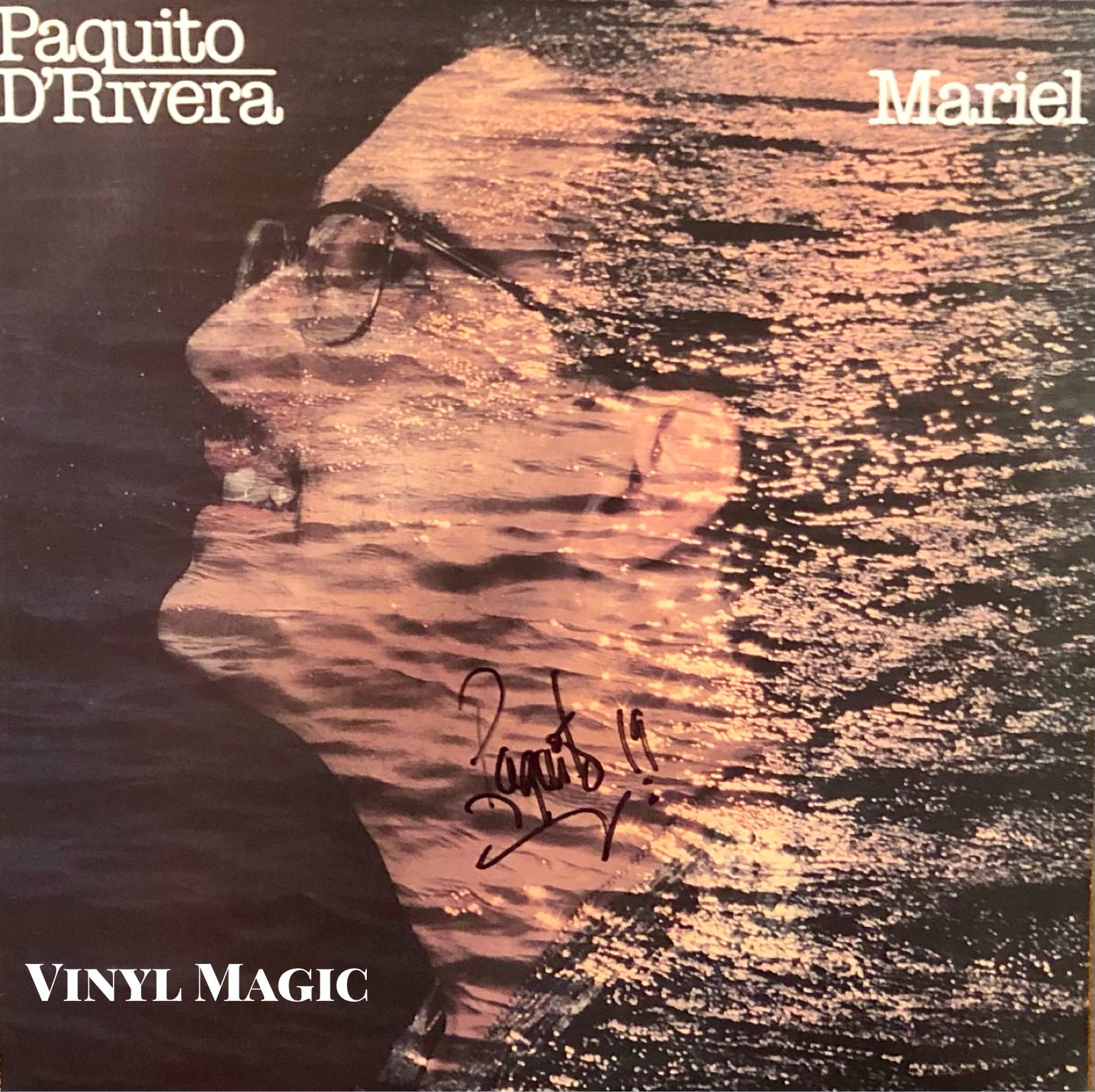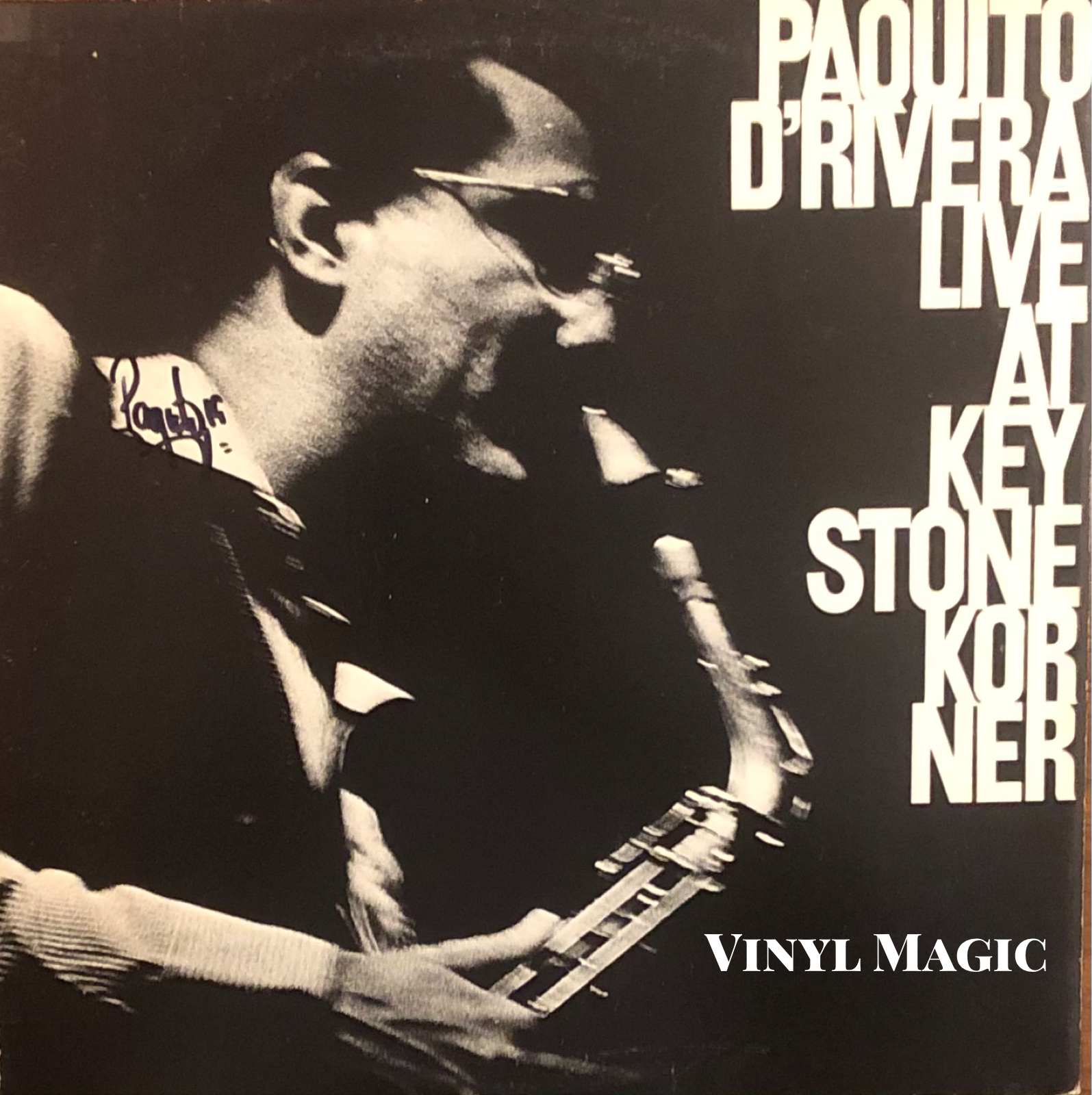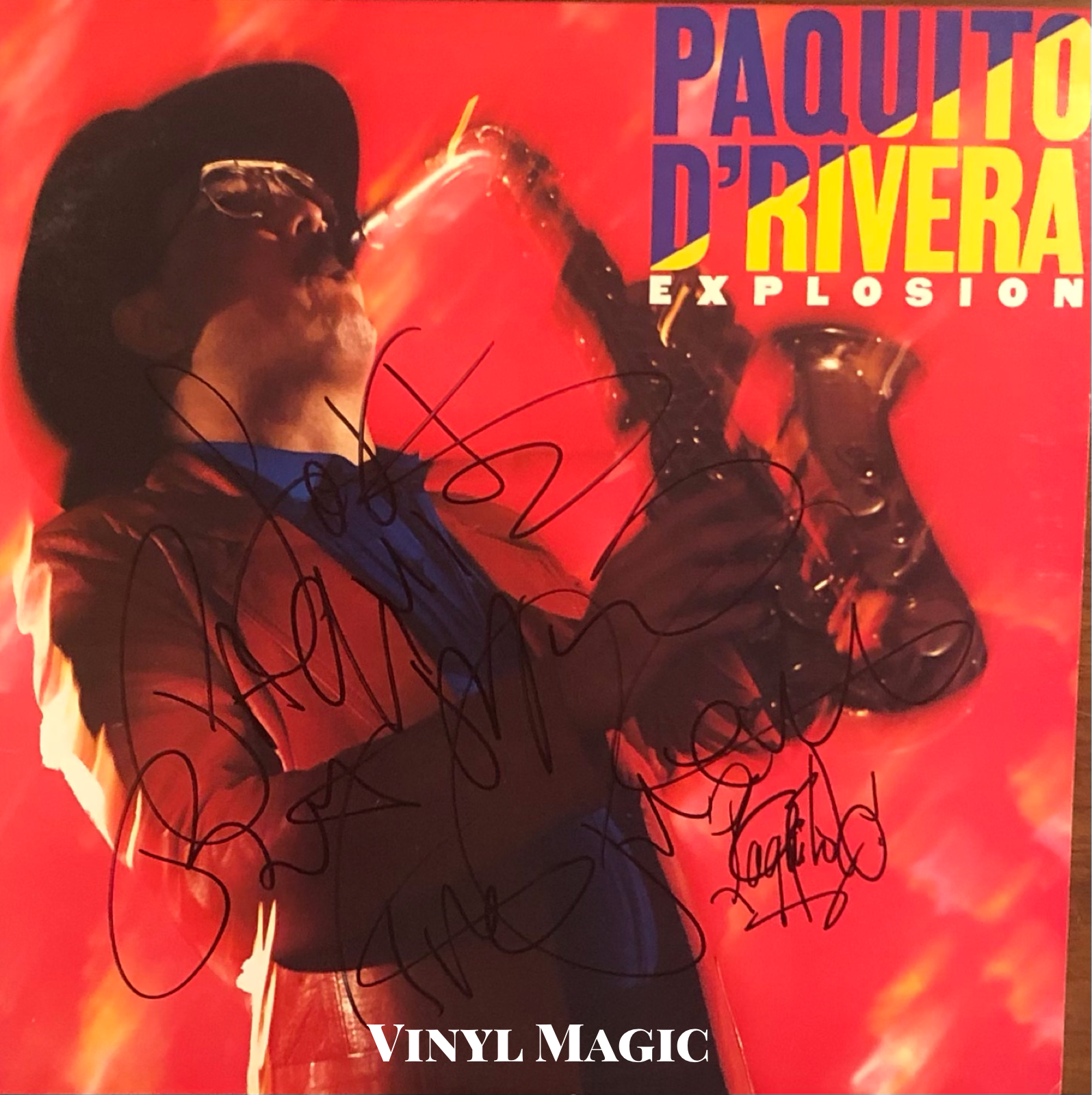Paquito D’Rivera and Me…
A great part of my childhood happened in the Tropicana club because my father on the side was a representative of the Selmer Company, so he used to sell instruments to the musicians of cabarets and military bands. For example, I saw the Nat King Cole Trio when I was eleven or twelve years old from the pit of the Armando Romeu Orchestra at the Tropicana. Of course, I was not able to go to the club at night in the main hall, but I was able to be in the orchestra pit and all that. And I went to many rehearsals, so I developed very good ears for what other musicians had to say, the friends of my father. So, little by little, by listening, by transcribing the solos and all that, I learned how to play. And still today, I am trying.
Paquito D’Rivera 2016
Grupo Irakere (1976) signed by Paquito, Arturo Sandoval
I think it was around 1970 that Herbie Hancock said in an interview in Downbeat, when somebody asked him, “What is jazz?” He said, “Jazz is something impossible to define and very easy to recognize.” This music is unique, the feeling when you play, and jazz is as much as what Ornette Coleman does as what Tito Puente does when he plays the Latin jazz thing... it’s the result of a multi-national culture, of a multi-cultural country, and it’s a blessing for the entire world. It’s the music of the world, and the best way to promote freedom and peace is through jazz music. You don’t even have to speak the language. You go to, I don’t know, Japan or to Taiwan or wherever, and three or four musicians start to improvise, and they start playing what they call the standards, and there is peace and understanding immediately. Even if you play wrong chords, they will try to help you. Jazz is a blessing and it’s the contribution of America to the world. That is what I think. It’s the greatest contribution of America to the world, so God bless America for that!
Paquito D’Rivera
Irakere (1977) signed by Paquito, Arturo Sandoval, Chucho Valdés
Dizzy was probably the dearest jazz musician ever. He was so generous not only creating a great career for himself, but he enabled others to make their own career, me included. I remember when he called me in 1981, he was supposed to do a two month tour with his quintet and Toots Thielemans was supposed to be his guest artist. And I had recently arrived in this country and then he called me. I was working in Washington DC at Blues Alley. They said, “Dizzy Gillespie is on the phone for you.” I thought, ‘What happened?’ And I answered the phone, I said, ‘Hello Dizzy, can I do something for you?’ He said, “Yeah, Toots Thielemans had a stroke.” I say, ‘Oh my God.’ “Well, he’s doing fine but he’s not going to be able to do this tour. He was going to be my guest artist. You want to sub for him?” It’s like someone calling me to do a movie instead of Marlon Brando or something. I said, ‘Dizzy, I am not as well known as Toots Thielemans.’ And Dizzy, typical, he said, “You want to do it, do it, or you don’t!” ‘Yes sir!’ Then, after that tour, I remember that the following year, I had my first wonderful tour with my own group in Europe. So this is how generous Dizzy was, and what a wonderful person, fantastic musician... and he was a blessing in my life and the life of many many many many of us. He will be remembered forever.
Paquito D’Rivera
Irakere 2 (1979) signed by Paquito
Music is an abstract art mainly. You don't have to call your music anything. I remember once I asked Jaco Pastorius when I met him many years ago, he was playing something, one of those things that he plays, and do you know what he was playing? 'What do you call that thing? What?' And he said, "Oh, I call it music." He was playing something out of this world and he called it music. That thing that Jaco Pastorius played, I don't know...maybe you can call it jazz, but it sounded like something else. He had a lot of rock 'n' roll, had a lot of classical... He called it music.
Paquito D'Rivera
Irakere 2 back cover signed by Arturo Sandoval
Winner of fourteen Grammys in his storied career, including Best Latin Album, Best Classical Contemporary Composition, Best Classical Recording and Best Latin Jazz Album, Paquito D’Rivera is an accomplished arranger, composer, clarinetist and saxophonist. Equally proficient in jazz or classical music, Paquito grew up in Havana, Cuba and his father, a classical saxophonist, was a seminal influence. Paquito recalled in a recent interview, “Well, my father is still today a main figure to look up to in my career. He was a classical saxophone player. He never had the ability to improvise, but he loved the music of Ellington and especially the Goodman Orchestra... he never called it jazz, for some reason he didn’t like the word jazz. He preferred to call it swing. He’d play the Goodman Swing Orchestra back to back with Goodman’s wonderful rendition of Mozart’s Clarinet Concerto. So I was like eight or nine years old and I was pretty confused. But it was a very happy confusion, because he had the concept of that music. He was very Ellingtonian, not only because he loved the Ellington orchestra, but because he said there are only two kinds of music: good and the other is not.”
Blowin’ (1981) signed by Paquito
Under his father’s care, instruction and tutelage, Paquito became a prodigy on saxophone and clarinet, performing with the National Theater Orchestra at age ten. Later, he studied at the Havana Conservatory of Music where he met the preternaturally talented pianist Chucho Valdes. Paquito was also a featured soloist on saxophone and clarinet with the National Symphony of Cuba when he was only seventeen. As his musical journey continued, Paquito was able to perform jazz when mores in Cuba briefly loosened, as he recounted, “There was a time when jazz music was a four letter word in Cuba - literally! After many years of that thought, in 1967 they decided to create the Orquesta Cubana de Musica Moderna. There were a lot of left wing people going to Cuba, attending congresses and visiting, so the government decided to create an image that Jazz was not forbidden and that nothing was forbidden there. They created the Orquesta to play American music - that is incredible. I directed the band for two years... When I decided that I wanted to play only jazz in the Orquesta, then I got fired, and after a while the Orquesta ceased to achieve the function that it was created for and it disappeared.”
Mariel (1982) signed by Paquito
Though the Orquesta was defunkt, Paquito met some invaluable friends and in 1973, he joined forces with Chucho Valdes and founded Irakere, a Cuban jazz supergroup, perhaps the only one of its kind. Irakere released many influential jazz records which incorporated elements of bebop, classical music, Cuban folklore, Cuban popular dance and jazz in a compelling fusion. Presently, it's hard to understand how brave and courageous it was for Paquito and his fellow artists to perform and record this music. At the time, Cuba's Ministry of Culture derided jazz as the "music of imperialist America," and the great trumpet maestro Arturo Sandoval was once threatened with imprisonment for the scabrous sedition of listening to American jazz on the radio. Arturo remembered the restrictive nature of recording in Cuba, "We wanted to play bebop, but we were told that our drummer couldn't even use cymbals, because they sounded 'too jazzy.' We eventually used congas and cowbells, and in the end, it helped us to come up with something new and creative." Yes, this was years before Ry Cooder's sanctioned visit to Havana in the late 1990s and subsequent reclamation and deification of the beneficent Buena Vista Social Club. These were hard and dangerous times indeed.
Live At Keystone Korner (1983) signed by Paquito
Paquito, in particular, chafed under these restraints and was always flirting with imprisonment for his candor and irreverence . As he reflected on the differences between Cuba and the US in a 2016 interview, "I am sometimes a little polemical. If you're polemical in this country, your problem can be personal with the people who don't like your invective or have a different opinion, but that's about it. But being polemical in a totalitarian system can be fatal. So what would have happened to me is unpredictable, because when I see something I don't agree with, I have to say it. I did that when I lived there. I didn't get in trouble because I was a popular musician with Irakere and had many friends, but that was going to end any minute. Chucho once told me: 'Man, you have to stop with all this bullshit; now calm down, do your work.' I said yes, because Chucho and Oscar Valdes had taken me out of involuntary retirement and put me to work again in Irakere. For two years, I did nothing, and they paid my salary. I knew sooner or later I'd get in trouble, so it was time to leave." Not surprisingly, Paquito defected to the United States via Spain in 1980 (with Chucho's blessings), and joined his mother and father who had left Cuba in 1968. Arturo Sandoval subsequently left Cuba a decade later in 1990.
Havana/New York (1978) signed by Paquito, David Amram, Candido, Arturo Sandoval
Since his defection in 1980, Paquito has released more than thirty-five jazz albums as a solo artist, recording with David Amram, Cachao, Dizzy Gillespie, Herbie Mann, Astor Piazzolla, Tito Puente and so many others in his extensive and varied discography. As impressive, Paquito has collaborated on many classical recordings, including four albums with acclaimed cellist Yo Yo Ma, and he has performed his compositions with the Baltimore Symphony Orchestra, the London Philharmonic, the London Symphony Orchestra, and the National Symphony Orchestra. As he explained, "When I compose classical compositions, I mix all that I learned in my life from the Cuban music to the Brazilian music that is my love...And if you ask me about my style, it's a mix of all that I have been learning all my life and still learning today. When you think you are a finished musician, you are finished." No doubt, his father is smiling down from the heavens relishing all his son’s accomplishments, in classical music, jazz and otherwise.
God Rest Ye Merry Jazzmen 1981) signed by Paquito, Percy and Jimmy Heath, Arthur Blythe, McCoy Tyner, Wynton Marsalis
A New Jersey resident since the early 1980s, he has never forgotten his Cuban roots, as in 2005 when he lambasted Carlos Santana for wearing chic Che Guevara apparel at the Oscars ceremony. Paquito wrote an open letter to Carlos which was published in El Nuevo Herald in March 2005 which excoriated Santana’s sartorial choice of wearing a crucifix over a Che t-shirt, whom he called "The Butcher of Cabana, the moniker given to the lamentable character known as Che Guevara by those Cubans who had to suffer his tortures and humiliations in that nefarious prison. One of these Cubans was my cousin Bebo, imprisoned there just for being a Christian. He recounts to me on occasion, always with infinite bitterness, how he could hear from his cell in the early hours of dawn, the executions, without prior trials or process of law, of the many who died shouting, "Long live Christ The King!" Though scathing in his criticism, Paquito was not inaccurate. As he had promised, “If I see something wrong..."
Latin Jazz Celebration (1983) signed by Paquito, David Amram, Candido, Arturo Sandoval
I have been blessed to see Paquito many times over the years and his performances have always been exceptional. On and off stage, he is full of impossibly good cheer. One time, as I was leaving his dressing room at the Blue Note with a batch of signed vinyl, Tito Puente was walking toward me to visit Paquito. I said 'Hello,' and Tito saw my Paquito Explosion record and asked to see it, "Oh, this is a great record, I'm going to sign it over his signature," which El Rey did as he inscribed it "To Paquito, Best Wishes", two great musicians paying homage (and pranks!) to one another.
Explosion (1985) signed by Paquito, Tito Puente “To Paquito “ mucho gracias El Rey!!!
Erin and I saw Paquito again on December 6, 2019 at the Jazz Forum in Tarrytown, New York. His quintet included Diego Urcola on trumpet/flugelhorn, Alex Brown on piano, Hamish Smith on bass, Eric Doob on drums, and a very special guest on trombone - longtime SNL band fixture - Steve Turre. It was a marvelous night of music performed by these magnificent musicians. Highlights were "Fantasia Impromptu," from the Grammy winner Jazz Meets The Classics, which Paquito told us "was written by the great Puerto Rican composer Frederic Chopin" and "Concierto de Aranjuez," an exquisite piece written by Spanish composer Joaquin Rodrigo made famous by Miles Davis in 1960 on Sketches Of Spain. Paquito relayed that Rodrigo didn't like Miles' version, to which Miles responded, "You will when you get the (royalty) checks!" The band was crisp and the interplay between Paquito and Diego was fierce and inspiring. Noted trombonist Steve Turre joined for an extended blowing session on Dizzy Gillespie's "A Night In Tunisia." a fitting coda to a night of remarkable music.
Jazz Forum, Tarrytown, New York December 6, 2019. Paquito, Diego, Steve Turre
After the show, Paquito was especially gracious offstage as he signed some of his records. I asked him about Dizzy Gillespie's relatively unheralded and unknown prowess on piano, "Yes, he was a marvelous player. He may not have had the agility or dexterity of others, but Dizzy always played the right notes." I mentioned that I saw him sit in with pianist Roger Kellaway last year at the Hotel Kitano, "Oh, I love to play with Roger. He is so much fun to play with, everything flows so easy from him." He smiled warmly when he saw the Irakere records, "Yes, we had a lot of fun recording this music. These musicians are phenomenal, and I’m lucky they are also my friends.” Erin and I thanked him for his time, and especially his music.
Paquito signing at Jazz Forum
Paquito D'Rivera, a prodigiously talented musician and composer in classical music and jazz, his music is extraordinary and, thankfully, he is far from finished.
Viva Paquito D’Rivera!
Why Not (1984) signed by Paquito
Choice Paquito D'Rivera Cuts (per BKs request)
https://www.youtube.com/watch?v=nlGUdl5IkEI
“Descarga Mambo” live with Cachao
https://www.youtube.com/watch?v=kxF4tEssUfY
“Seresta- Samba For Carmen” live with Dizzy Gillespie
https://www.youtube.com/watch?v=7MB_PKLRv8g
“Juana 1600” Irakere live 1978
https://www.youtube.com/watch?v=zajkVjfxts8
“Romance en la Habana” El Arte Del Sabor with Bebo Valdes, Cachao
https://www.youtube.com/watch?v=3IM3feNLEK0
“Libertango” live 20004
https://www.youtube.com/watch?v=HBAwQdKp9E4
“Chequere Son”. Grupo Irakere (1976)
https://www.youtube.com/watch?v=GQ70TdzV-vU
“Valle de Picadura” Grupo Irakere (1976)
https://www.youtube.com/watch?v=SsPSVK1YRyc
“Claudia” live with Chucho Valdes
https://www.youtube.com/watch?v=FAwHiE8nnmw
“I Remember Diz - A Night In Tunisia” live
https://www.youtube.com/watch?v=eiF0a7hgN1A
“Mozart’s Adagio” live Kennedy Center 2017
https://www.youtube.com/watch?v=8OGD_qgv0eU
“Brasileirinho” live with Yo Yo Ma
Celebration (1988) signed by Paquito
Paquito blowing at Jazz Forum, 2019
Steve Turre blowing Jazz Forum, 2019
















